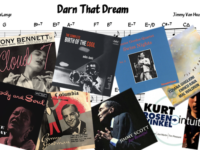Can Old School sound fresh? It did when Wynton Marsalis first burst onto the jazz scene at a time when tradition was largely ignored or widely diluted.
After a seventeen year stint in The Count Basie Orchestra, a sideman stint in Marcus Roberts’ combo and recording dates with such luminaries as Tony Bennett, Diana Krall, Ray Charles, and Tito Puente as well as gigs in every major jazz festival in the world at least once, Scotty Barnhart is finally ready to step out today with his own debut record called Say It Plain. And there was never a jazzman more ready for his first record as a leader than this cat.
It’s hardly surprising, then, that this record reflects not the product of a young talent just getting his feet wet but the quiet confidence of an old vet. For this first time out Barnhart sticks with traditional, mainstream jazz, but in doing so with such a pleasing variety of moods and formats, he reminds us just how much ground can be covered just by staying within that context.
The way this record starts can’t help but to put a grin on my face. “Giant Steps” is given the ol’ Mardi Gras street parade second-line treatment, totally transforming the Coltrane classic into its most fun rendition yet. Barnhart’s old boss Roberts also stars on this tune.
The strong start continues with Barnhart’s own gospel testifyin’ “Say It Plain,” the with a uniquely sweet ‘n’ saucy trumpet tone, and a finger-snapping relaxed vibe by all. The more challenging and shifty “The Burning Sands” comes next, where Barnhart shows off some Freddie Hubbard-worthy chops. “Haley’s Passage” is a mid-tempo groover and Barnhart does some his most thoughtful, probing trumpet playing on the record. The brief number “Dedicated To You” is just Barnhart pouring out some soft, melancholy notes over the piano of the grand patriarch Ellis Marsalis. “Put On A Happy Face” is the second familiar cover tackled here, a depiction that starts out with Barnhart playing cool and nimbly building up to hot, before cooling it down again. Bill Peterson adds a hard-swinging solo on piano.
The Dizzy Gillespie classic “Con Alma” pairs Barnhart with another trumpet player, that of Wynton Marsalis. The trading fours, call-and-response and light jousting between the two never devolves into a blowing session, but rather, a mature conversation between two seasoned pros. Marsalis, or course, remains the more talented of the two, but Barnhart holds his own without having to press. The song was wisely allowed to run nearly nine minutes to give these guys enough room to stretch out (and to keep that enthralling Latin groove going).
If the rest of the album doesn’t quite return to the peak of the teaming up with Wynton, it doesn’t fall off much, either. “Jnana” sports a classic, Blue Note hard bop quality, Frank Loesser’s “I’ve Never Been In Love Before” is nicely underpinned by Leon Anderson, Jr.’s nifty brushwork,” and “I’m Glad There Is You” is another ballad featuring the elder Marsalis, this time in a quartet setting.
Oh yes, did I mention that there’s a couple of vocals? Jamie Davis’ smooth baritone gives “Young At Heart” just the right amount of warmth while Barnhart’s muted horn noodles around in the background. “Pay Me My Money” once again finds the leader sharing trumpet duties with a big name, this time it being Clark Terry. But it’s the comical singing by Terry that steals the show. It’s yet another signal that even though Barnhart set out to make a serious jazz record, he and his guests don’t take things too seriously.
Barnhart’s introductory album Say It Plain is not out to turn the jazz world on its head, but it makes a solid case for turning it right-side up again. Stanley Crouch, perhaps the best-known defender of the jazz tradition, certainly agrees. In his lengthy liner notes for this album, Crouch nailed down what is so endearing about Scotty Barnhart when he wrote that Barnhart “understands that art is never really about style; it is about vitality. That is what separates the good from the bad.”
- Tomeka Reid Quartet – ‘3+3’ (2024) - April 30, 2024
- Claudio Scolari Project – ‘Opera 8’ (2024) - April 25, 2024
- Nick Millevoi – ‘Moon Pulses’ (2024) - April 23, 2024





